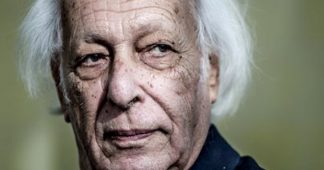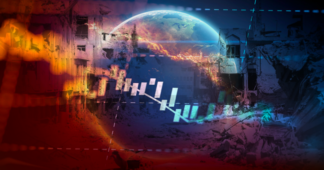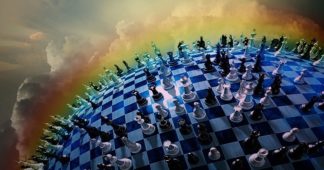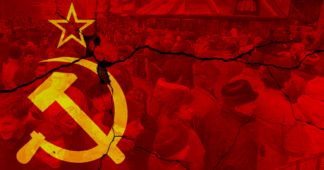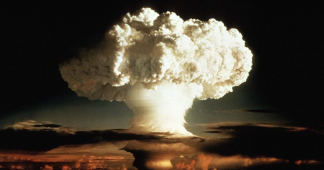By Dimitris Konstantakopoulos
The fall of the USSR in 1989-91 provoked a sense of omnipotence in the dominant circles of Western capitalism, all the more so as it was preceded by a decade in which neoliberalism triumphantly ascended in the West itself (1980-90), as well as the decline of a series of Third World regimes that had emerged from anti-colonial, national liberation movements and revolutions.
This feeling was captured by Francis Fukuyama in his essay on the “End of History”, what was essentially the end of the contradictory and heroic effort of modern man to become the subject of his own history. Everything was to be regulated by impersonal “markets”; in reality, those in a position to control global financial capital. It is a totalitarian project to control all people, societies, nations and states; to control all social and international evolution, appearing of course under the banner of democracy and the supposed self-regulating role of the “markets”.
After the collapse of “communism”, financial capital, more concentrated than ever before, experienced an unprecedented rise in economic and political power, taking over directly functions that normally belong to the states; the usefulness of states to big capital has diminished since the disappearance of the “external enemy” and of the internal movements of contestation.
An “Empire of Finance” has emerged which is becoming the real State of our time, to which individual states are largely subservient.
This Empire created an economic “New World Order” after the supposed end of the Cold War, based on the Washington consensus, the Maastricht Treaty and a series of international organisations such as the WHO, the IMF, etc. It imposes the release of financial capital from all control and all constraints on its activity, thus prolonging the crisis which has persisted since 2008. (Western aggressivity against Russia can be explained well by the desire of the US and Western economic elites to exercise absolute control in the former Soviet countries. But we cannot exclude that the financial crisis of 2008 has also played a role. As has often happened in the past, economic crises provoke wars and vice versa. The interrelationship between the economic situation and geopolitics in our time is a subject which has not receive the study and research it deserves).
With the 2008 crisis, ‘happy globalization’ (la mondialisation heureuse) is yielding to “unhappy globalization”. Europe is moving towards the accelerated demolition of the European welfare state, the greatest conquest of the European peoples since the victory over Nazism, culminating in the destruction, by economic and political means, of Greece. Since the banks are ‘too big to fail’, it is societies, states and nations that will fail. (Again, we witness an interesting correlation between economics and geopolitics. The severity of the economic “war” against Greece has nothing in common with the neoliberal programmes imposed on other peripheral countries of the EU. This also probably happened because of the geopolitical position of Greece and Cyprus. In history, all the campaigns of Western powers against the Russian or Islamic East have been preceded by attacks in order to control South-Eastern Europe).
Fukuyama’s project is based on the assumption that the assimilating power of the Western economic, political and cultural model is sufficient to support the global domination of Western Capitalism and those who control it. This is not the opinion of Samuel Huntington, who believes that such domination can only be established by force of arms and war. And because he cannot say so, he puts forward the racist and unsubstantiated theory that cultural differences inevitably cause conflict. He lays thus the foundations for a struggle of the “superior” collective West against the rest, but also for divisions among the “rest”, because no global domination can be imposed without the use of “divide and conquer” policies.
Of course, we all know that the European powers did not go to Africa to civilise the Africans, they went there to grab their raw materials. We also all know that the US did not intervene in dozens of countries around the world in order to establish democracy there, otherwise they would not have imposed bloody dictatorships all over the world, from Chile to Indonesia. And vice versa. If people and peoples who are at an extreme material disadvantage turn to religion (or even the partially secular “religion” of communism in the 20th century), they do so in order to be able to resist and exist.
Huntington’s theories are in reality little more than a kind of “philosophical cover” to the “War Party” if not the “hidden Fascism Party” which has existed for a century in the power centres of the collective West, antagonizing the proponents of a “democratic imperialism”. This party did not even wait for the USSR to be formally dissolved before starting the dissolution of Yugoslavia and the first Gulf War. Even before Huntington’s theories appeared, it is this party which drew up the programmes for an unprecedented imperialist extension, such as can be seen promoted in the Wolfowitz and Jeremiah reports. They were followed by Neoconservative elaborations such as “A Clean Break: A New Strategy for Securing the Realm”, which prescribed the Middle East wars that subsequently happened, as did the elaborations of the think tank Project for the New American Century. The steady eastward expansion of NATO and the gradual but systematic dismantling of the entire nuclear weapons control structure persisted (until the US attacked Syria in 2017 and 2018) in spite of the existence there of Russian troops, thus violating the unspoken rules for avoiding a direct engagement between US and Russia. Former President Trump used the North Korean crisis to familiarise world opinion with the possibility of the use of nuclear arms. France, the last bastion of European independence, fell under the direct control of the USA and NATO (and also a great deal of influence from Israel) when Jacques Chirac was succeeded by Nikolas Sarkozy in 2007, who played a leading role in the destruction of Libya, not so much for French neo-colonialist aims, but on behalf of the strategy of global neocons.
Of course, not everything is going well for the West. The massive investments in China, which also provided an outlet for Western Capital in search of low wages and high profitability, did not lead to an overthrowing of the planned economy, in other words to a Chinese perestroika yielding to “katastroïka” (with the market becoming a tool of economic planning). China used capitalist investment; it was not used by it. If it paid the price for its growth by seeing a dramatic increase in inequality, which could have been dangerous in the long run for its stability, it has been able to dramatically raise, in the last decade, the standard of living of the poorest strata of its population and to avoid succumbing to the power of “financial globalization”. More generally, Western investment throughout the Third World has had contradictory results. We are now witnessing the emergence in the global South of large economic and demographic aggregates that objectively undermine the global dominance of the collective West.
Action brings reaction. People have started resisting. We have seen it in a number of countries in the Middle East; in Iraq, Afghanistan, Lebanon, Syria and Iran, culminating in the epiphany of the Palestinian resistance today in Gaza. Russia, in turn, has also reacted increasingly strongly to NATO’s expansion plans inside the former USSR. Similar phenomena can be observed in Latin America and other regions of the world.
Today, the emergence of a multipolar world around the Shanghai Organisation and the BRICS represents a great hope for humanity to finally cancel the totalitarian and unipolar project of the West.
It is a first and very important step. One hopes, of course, that it will soon be complemented by other steps, such as de-dollarisation, the creation of a functioning investment bank, operating on principles opposite to those of the World Bank and the IMF, the gradual creation of the institutions of a new economic world order based on cooperation rather than competition and the pursuit of sovereignty, equality and freedom.
The resistance of a series of powerful states to the West is certainly the first, absolutely necessary, but not in itself sufficient condition for the radical transformation of our world, which, for the first time in its history, has developed productive forces and technologies capable of satisfying the legitimate needs of all humanity, but sees them used for the moment for barbarism and totalitarianism, if not pursuing the nuclear or ecological destruction of the human species.
This alternative pole to the West that is tending to emerge today promises to speak about the great problems of humanity, to become its voice, to intervene in the great crises such as the one we see today in the Middle East, to speak about the environment and the need for the social and international control of new technologies, to act against inequalities within and between states, to put forward the vision of an economy that combines the market with economic planning, without which it is impossible to tackle any problem at national, regional or global level. If it succeeds, it will greatly broaden its support among all peoples, even among the peoples of the West, who are increasingly aware of the deadlock and totalitarian nature of the system they live in, but do not know how to change it and what to replace it with.
War is the continuation of politics by other means, said Clausewitz. The gradual emergence of a vision that interests and moves all of humanity may even be a game changer for the ongoing armed conflicts. Our world is in urgent need of a fight against inequality, both within and between states. New technologies, such as artificial intelligence, biotechnology and information science, require national, social and international control if we don’t want to blow up the planet or destroy the human race. The market will be with us for a long time, but none of the social, economic, or ecological problems can be tackled without a system of cooperative economic planning at the local, national, regional and global level. It is necessary that the intellectual, psychological and cultural level of humanity, that is to say of each individual and of each people individually, be raised to the level of the formidable productive, scientific and technological powers that we have, for the first time in our history, acquired. The way to make this happen, apart from continuous education and training, is to advocate for the widest possible participation and cooperation of people and peoples, at every level, in the decisions that affect them.
The formulation, by the forces which oppose the “collective West”, of a new vision for humanity, a new economic and cultural vision that responds to the deeper needs of human beings and to the needs of life itself and the protection of the natural environment, a humanity that gradually moves away from its fiercely competitive past, without which there will be neither civilization nor life, could be a strategic game changer, breaking the actual tendency of the Western elites towards a quasi-totalitarian control of Western societies, contributing to the removal of the danger of a nuclear or ecological holocaust, and allowing the foundations to be laid for a new and superior civilisation, in which all the peoples of the world will be called upon to make their special contribution.
History has afforded the peoples and states of the East and the South the historical task of confronting the hegemonic appetites of the West with a new, more egalitarian and cooperative model, with an effort to include the Western peoples themselves, as far as possible; their rivalry should be directed against the Western ruling elite alone, not the common people. After all, the tradition of the West itself is deeply contradictory and, historically, its achievements are as important as its totalitarian and destructive tendencies. There is no need to ‘throw the baby out with the bathwater’.
Ex Oriente Lux be though our hope!
Published May 2024
valdaiclub.com
We remind our readers that publication of articles on our site does not mean that we agree with what is written. Our policy is to publish anything which we consider of interest, so as to assist our readers in forming their opinions. Sometimes we even publish articles with which we totally disagree, since we believe it is important for our readers to be informed on as wide a spectrum of views as possible.
